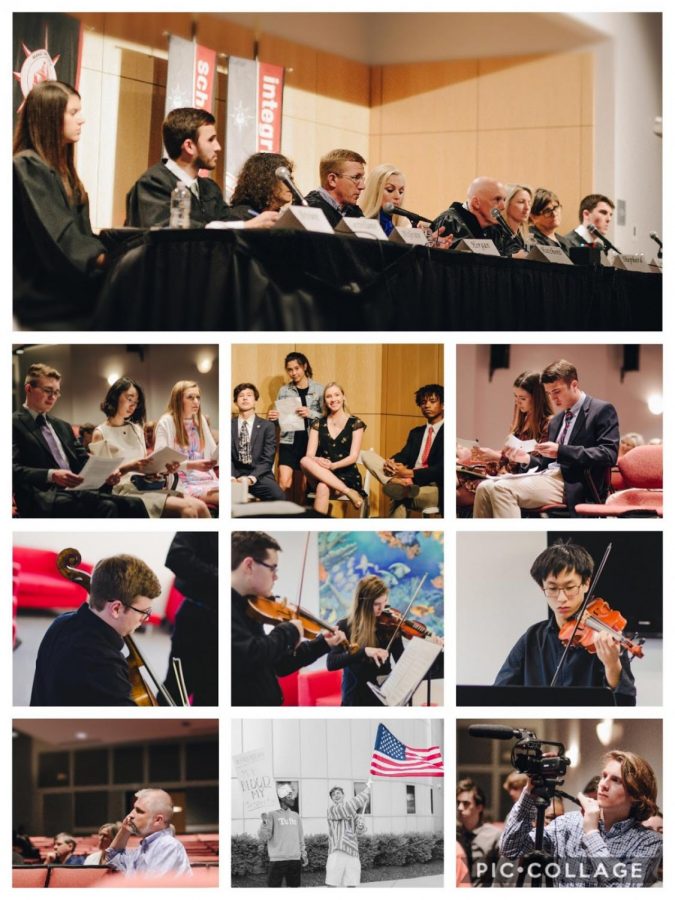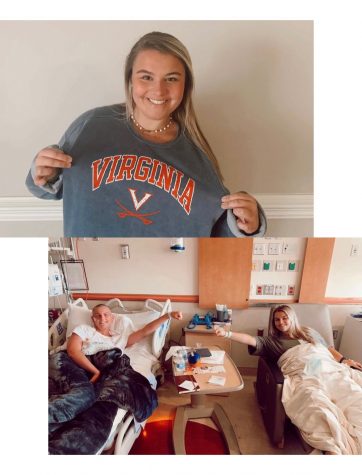Cape Henry Collegiate Supreme Court 2019
Many students from Mr. Scott McGraw’s AP US Government and Politics classes participated in the annual CHC Supreme Court. Some of the ways students were involved including arguing as lawyers, greeting guests with music, hosting the event, presenting information about the cases, protesting, taking photos, and recording the program. Photo Credit: Reiley Emerson Photography
Cape Henry Collegiate Supreme Court 2019
On Wednesday, April 24th, 2019, student lawyers Stephanie Strickland and Caroline Dixon argued the case of Mitchell v. Wisconsin with Ben Schwantes, who represented the interest group Mothers Against Drunk Driving, as an amicus. Additionally, Flynn Somers and Jasmine Zhang argued the case Rehaif v. United States. The nine justices representing the CHC Supreme Court were Chief Justice Hutchens, Allen, Brown, Castellano, Garran, Gregory, Horgan, McGraw, and Shepherd.
Mitchell v. Wisconsin
The evening began with the case Mitchell v. Wisconsin, which asked, “Can the police take your blood without a warrant?” Stephanie, arguing for the petitioner Gerald P. Mitchell, requested that the Court overturn Mitchell’s conviction of driving under the influence (DUI), claiming that the petitioner never consented to the blood draw that was used to determine his blood alcohol concentration (BAC), requiring someone to give up their right to privacy to obtain a license is unjust, and the police could have easily obtained a warrant before performing the blood draw. The justices asked many questions questioning the validity of Mitchell’s appeal, but Stephanie reaffirmed that even if Mitchell gave consent for search when applying for his driver’s license, he did not give consent at the time of the blood draw, so using the evidence from this procedure in a court of law violated the Exclusionary Rule. The blood draw was also considered an unreasonable search, which citizens are protected from by the fourth amendment.
Caroline Dixon represented the respondent, the state of Wisconsin, and requested that the court’s previous decision to convict Mitchell be upheld. Caroline argued that the court has consistently ruled in agreement with the implied consent statute, driving is a privilege that can have conditions placed upon it, and a warrant was unnecessary in the case at hand. The main discussion during Caroline’s argument focused on the absence of a warrant during the blood draw. Caroline claimed that a warrant was not needed to take the petitioner’s blood because the police had probable cause and were under exigent circumstances. Mitchell’s neighbor witnessed him in an intoxicated state before entering his car and driving away. Furthermore, the breathalyzer test that was conducted showed that Mitchell’s BAC was .222 when Wisconsin’s legal limit is .08; had the police waited to obtain a warrant, the BAC would have decreased over time and therefore, there was the potential that there would be no valid evidence that could be used in trial. Additionally, it was the hospital’s standard procedure to draw Mitchell’s blood, as he later became unconscious due to his excessive intoxication.
Ben Schwantes’s representation of the interest group Mothers Against Drunk Driving aided in strengthening Caroline’s argument for the state of Wisconsin. Ben argued that a blood draw was the most effective means of testing Mitchell’s BAC compared to a breath or urine test and is a reasonable search in this case because of the police’s probable cause and the exigency of the situation. Moreover, Ben’s use of the phrase, “The needs of the many outweigh the needs of a few” made Wisconsin’s argument more convincing, as it is more important to consider the safety of the public than the privacy of a “selfish” drunk driver.
Ultimately, the final opinion regarding Mitchell v. Wisconsin decided to uphold Mitchell’s conviction for driving under the influence, 7-2. As written by justices McGraw, Chief Justice Hutchens, Justices Allen, Garran, Gregory, Horgan, and Shepherd, “Driving is a dangerous activity – all the more so when drugs and alcohol are involved. The Wisconsin [implied consent] statute imposes a reasonable condition on the privilege of driving on the Wisconsin roads.” Therefore, the blood draw used as evidence was valid in court and did not violate Mitchell’s fourth amendment right. While Caroline won as the counselor for Wisconsin, Stephanie was chosen as the best lawyer of the program and will participate in next year’s event as a justice.
Rehaif v. United States
The second case of the evening was Rehaif v. United States, which asked the question, “What if an illegal immigrant doesn’t know he is illegal?” Flynn Somers argued for the petitioner, Hamid Mohamed Ahmed Ali Rehaif, a young man from the United Arab Emirates who entered the United States on a student visa but was dismissed from school and deemed to be in the country illegally. He was oblivious of the change to his immigration status. After a search of his hotel room, Rehaif was arrested for violating the Firearm Owners’ Protection Act because he was considered an illegal immigrant and was in possession of ammunition from a firing range. While this is true, Flynn’s primary argument for this case was that Rehaif was unaware of this change and therefore, his penalty for this crime was unjust. The statute’s plain language that stated “whoever knowingly violates subsection…(g)… of section 922 shall be fined” regarded both the possession of the firearm and the status of the immigrant and was the central topic of this case. Flynn argued that Rehaif did not know that he was considered an illegal immigrant when he obtained a hunting license and bought ammunition from a firing range. Additionally, the government did not contact Rehaif after the change of his status, so Flynn requested the Court to overturn Rehaif’s conviction.
Jasmine represented the respondent, the United States, and argued that Rehaif’s conviction should be upheld. Jasmine claimed that the email that Rehaif received from his school, FIT, regarding his dismissal from the university was enough to inform him that he would be considered an illegal immigrant and that his student visa was terminated, something that would only be changed if he continued his studies at a different institution. Furthermore, Jasmine emphasized that Rehaif was not forthcoming when he was asked about his student visa status, claiming it was still valid; after further questioning, he admitted that he was aware that his visa was no longer legitimate and consented to a search of his hotel room where the ammunition he purchased was found. In addition, Jasmine also argued that it is very difficult for the government to prove whether an immigrant is knowingly violating the law, so if the Supreme Court were to overturn the lower courts’ decision, it may set a dangerous precedent for future cases.
The final opinion in Rehaif v. United States by the CHC Supreme Court favored Rehaif, 5-4. The deciding factor in the case, as written in the majority opinion, was that “one cannot know that he is violating 922(g) unless he knows that he is illegal, as gun possession is otherwise a constitutionally protected activity. The idea that the ‘knowingly violates’ phrase skips over status and only applies to possession defies logic.” For these reasons, Rehaif did not break the law and violate the FOPA, meaning Flynn won as the counselor in this case.
To watch the recording of this event, click on the link to CHC TV, the student-run club that posts numerous videos of Cape Henry athletic games, concerts, and other student activities.


